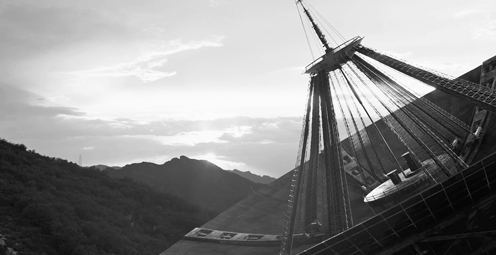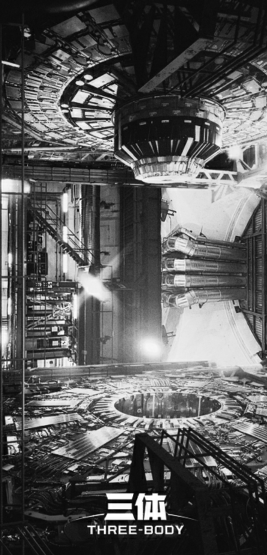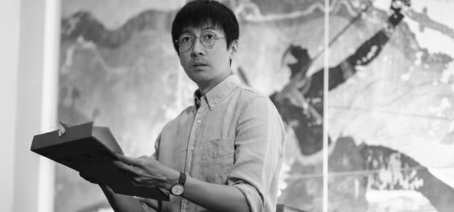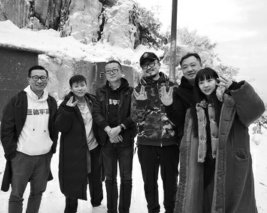SET FOR WORLD DOMINATION
Epic, long-awaited TV adaptation of award-winning sci-fi novel The Three-Body Problem, in which Earth faces a deadly alien threat, gets a global release, Xu Fan reports.

In 2006, Bai Yicong stumbled upon the basis for The Three-Body Problem — the novel, which, nine years later, would go on to become Asia's first Hugo Award winner — in the magazine Science Fiction World. He was immediately captivated by the mind-bending epic.
Then at the start of his career as a scriptwriter in the television industry, Bai, who would later establish his own drama production company Linghe Culture Media, didn't realize the novel would become one of his most successful, yet also time-consuming, projects.
Taking a total of seven years, Three-Body, the long-awaited live-action TV adaptation of writer Liu Cixin's award-winning classic, has been brought to life, with hopes of being one of the most popular TV series in the Year of the Rabbit.
It has been released domestically and overseas, with subtitles in several languages, including English. So far, it has earned a rating of 8.2 points out of 10 on China's influential review site Douban and 7.8 on IMDb, the United States-based online movie and TV database.
Widely considered to be a milestone masterpiece, ushering in a new era for homegrown sci-fi works, The Three-Body Problem is the first book in Liu's Remembrance of Earth's Past trilogy (colloquially known as the Three-Body trilogy). It was first published in China in 2008, before being translated into English in 2014. After taking home the Hugo Award, the world's premier science-fiction award, the book made global headlines, becoming one of the most sought-after intellectual properties in China's burgeoning movie and TV industry.
However, the novel's stellar reputation has become something of a challenge to those who aspire to visualize the epic tale, bringing to life the conflict between humankind and Trisolarans, the fictional alien race depicted as ruthless invaders, scheming to conquer our planet after escaping their own uninhabitable home, which sits approximately 4.21 light-years from Earth.
Bai recalls that the major scenes deviate slightly from the book, as producers were worried that the complexity of some of the hardcore sci-fi elements in Liu's original work may be too technical, and some viewers could lose interest.
With the assistance of Liu, who participated in several meetings — with the longest lasting in excess of six hours — the script was revised more than 20 times between 2016 and 2020. Bai says he was excited to meet his literary idol and was surprised to find Liu was more receptive than he had imagined.
After convincing director Yang Lei, also a diehard sci-fi enthusiast, to join the production, Bai persuaded actor Zhang Luyi to play the protagonist Wang Miao, a reserved and determined nanomaterials scientist, and a key figure in the fight against the alien invaders.
Known for playing several bookish characters, most notably a mathematics teacher in the 2017 crime movie The Devotion of Suspect X, Zhang was the first candidate to pop into the casting team's mind, as he displays the right temperament for the character, according to Bai.
Aside from Zhang, veteran actor Yu Hewei plays Shi Qiang, a cunning police officer.
Actresses Li Xiaoran and Wang Ziwen respectively play Shen Yufei and Ye Wenjie, two scientists colluding with Trisolarans, as they wrongly believe the highly-advanced alien civilization can save humankind.
Starting in 2007, the TV series unfolds with a series of mysterious suicides of renowned scientists.
Wang and police officer Shi delve into the investigation and discover the Trisolaran plan to hinder Earth's scientific development to bide time for its fleet, which is set to arrive around 450 years in the future.
Producer Cai Jia says the drama features about 1,000 locations, which were shot in Zhoushan, Ningbo and Hangzhou in Zhejiang province, Heihe in Heilongjiang province, and Beijing between June and December in 2020.
As the tale touches on a string of complex scientific theories, Cai recalls they invited more than 30 Chinese scientists from various fields like physics and mathematics to give lectures to the cast and crew. They also managed to shoot several iconic scenes at China's top scientific sites, including the National Center for Nanoscience and Technology and the Beijing Electron Positron Collider's national lab.
For Cai and her fellow crew members, it was like a once-in-a-lifetime opportunity to participate in the production of Three-Body, which also led them to re-examine their own feelings concerning the continuation of civilization.
"Liu's Three-Body trilogy is a very interesting and intriguing classic. No matter how many times you read it, you will gain a new understanding every time," says Cai.
"One of its main charms lies in its bland depiction of an unprecedented crisis in seemingly routine, down-to-earth scenes. For example, scientist Wang and police officer Shi talk about the fate of humanity in a small restaurant, but Shi is also worried about his mortgage and his son's education," echoes Bai.
"Such scenes inspired from typical modern Chinese lives make it more culturally familiar to all of us. For a moment, you would even believe what is depicted in the novel could take place in the real world," says Bai.





Today's Top News
- China's industrial profits down 1.8% in H1
- Thailand responds to Trump's ceasefire call
- Recall vote shows DPP's manipulation runs against Taiwan people's will: mainland spokesperson
- Top DPRK leader visits China-DPRK Friendship Tower
- China proposes global cooperation body on AI
- Scholars propose inclusive human rights framework






























